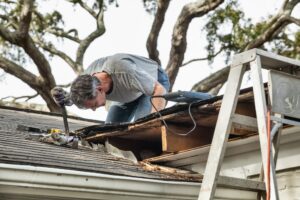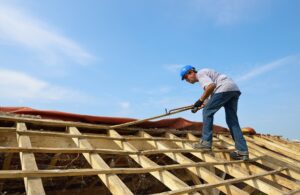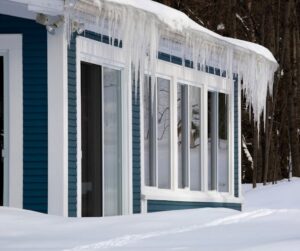Shingles can be constructed from a variety of building materials, and each one has its advantages and disadvantages. If you need new shingles on your roof, here are some of the most common choices and why you might want each one.
Asphalt Shingles: Economical and Popular
Asphalt shingles are made from asphalt, which builders prefer largely for its waterproofing properties. These are the most popular type of shingle on residential properties, and they’re popular for a few different reasons.
Shingles made from asphalt tend to be relatively lightweight, affordable, easy to maintain, and energy-efficient. Ones that come in a three-tab configuration, which is one of the more common and affordable configurations, tend to last between 15 and 18 years.
The main drawback of asphalt shingles has to do with durability in certain climates. Sudden temperature changes can cause the shingles to crack, and any cracked ones need to be replaced in order to maintain a waterproof covering.
If you live in an area that sees sudden and extreme temperature changes, asphalt shingles might not last as long as they would in other parts of the country.
Fiberglass Shingles: Fire-Resistant and Longer-Lasting
Fiberglass shingles consist of a fiberglass underlayer and an asphalt overlayer. The fiberglass layer contains overlapping fiberglass fibers that secure together with an adhesive.
In fiberglass shingles, the fiberglass adds durability and fire resistance, while the asphalt still provides complete waterproofing. The shingles are also resistant to ultraviolet rays and can last longer than plain asphalt shingles. Additionally, this is still a highly affordable option.
If you live in an area that does see extreme temperature changes, fiberglass shingles will have lower average yearly costs than an asphalt shingle that is prone to cracking. Even if you’re in a relatively moderate region, the added life span of these shingles can make them an excellent value.
Organic Shingles: Eco-Friendly and Affordable
Organic shingles are so-named because they’re made from recycled cardboard, rags, paper, wood chips, and similar materials. These shingles are pressed into the proper shape and made so that they’re waterproof.
Compared to other options, organic shingles have a few drawbacks. They’re heavier than fiberglass shingles, and they don’t last as long as fiberglass ones. In humid environments, they can collect moisture that reduces their life span.
In spite of their disadvantages, organic shingles have two big benefits. First, they’re quite inexpensive. Second, they’re an eco-friendly option for homeowners who want an environmentally friendly roofing solution. For some, this one benefit outweighs all other considerations.
If you’re especially conscious of your environmental impact, organic shingles may be a good shingle to use. Otherwise, there’s likely a better alternative that will last longer.
Tile Shingles: Reflective and Beautiful
Tile shingles are made from concrete or clay tiles, and they have a lot of advantages. These tiles can be pressed into almost any shape, and they’re available in a range of light colors. The lighter coloring helps these tiles reflect the sun’s rays, and the tiles look beautiful when incorporated into a home’s design.
Regarding longevity, tile shingles also last a long time. There are some clay roofs still intact from the neolithic era. As long as they’re properly installed, these will normally outlast the building they cover.
These benefits come with one major drawback, however. Tile shingles are expensive, both to make and to install.
Slate Shingles: Environmentally Friendly and Attractive
Slate shingles are made from natural slate stone, so they’re environmentally friendly. They also have a striking appearance and can last a long time if they aren’t fractured.
Shingles made from slate are heavy, though, and they can break if large or heavy falls on them.
Slate shingles might be a good option if you’re looking for an environmentally friendly roofing solution and there aren’t any trees near your home that could drop branches on its roof.
For help selecting shingles for your roof, contact a professional at Precise Roofing and Contracting.





